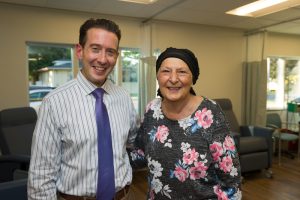
Early Signs of Inflammatory Breast Cancer
Regional Cancer Care Associates (RCCA) provides comprehensive treatment of cancer and blood disorders to patients throughout New Jersey, Connecticut, and the Washington, DC, area. Here,
HIPAA Alert: Potential Data Breach Learn More
Questions on Oncology, Hematology and/or Infusion Clinical Services due to COVID-19 Crisis – CALL 833-698-1623
Important Information for Our Patients Regarding the Coronavirus.
RCCA Providing Area Cancer Patients with Access to Care During Coronavirus Outbreak
RCCA Offering Patients Virtual Visits During Coronavirus Pandemic
Paget’s disease of the breast is a rare skin condition that is a form of breast cancer. Though uncommon, it can be an indicator of invasive breast cancer. Regional Cancer Care Associates (RCCA) treats Paget’s disease and other cancer types at locations near you throughout New Jersey, Connecticut, Massachusetts, and the Washington, D.C., area. RCCA employs innovative, evidence-based treatments and a comprehensive approach in pursuing the best outcomes for patients. Learn more about Paget’s disease of the breast and the treatment options offered.
Paget’s disease of the breast is a rare type of breast cancer. In people with this condition, malignant cells called Paget cells are found in the skin of the nipple and areola (the small circular area of pigmented skin surrounding the nipple). Paget cells are found in the epidermis, or surface-level skin, and have a large, rounded appearance when viewed under a microscope. They can be found as single cells or as small groups. Most people with Paget’s disease of the breast also have tumors elsewhere in their breast, including the milk glands, milk ducts, and fatty tissue.
Paget’s disease of the breast is named after a 19th-Century doctor, Sir James Paget. In 1874, he noted a relationship between breast cancer and changes in the nipple. Dr. Paget is also credited with identifying several other diseases now named after him, including Paget’s disease of the bone. These are not related to Paget’s disease of the breast and should not be confused with one another. Paget’s disease of the breast is sometimes known as mammary Paget’s disease.

Doctors do not yet know what causes Paget’s disease of the breast. One commonly accepted theory is that the milk ducts carry cancer cells to the nipple and areola, where they cause new malignant cells to form. This could explain why mammary Paget’s disease is usually found alongside other tumors in the same breast. Another possibility is that skin cells turn cancerous by themselves, which might explain why mammary Paget’s disease sometimes occurs in breasts with no other tumors.
According to the National Cancer Institute, about 1% to 4% of all breast cancer cases involve mammary Paget’s disease. Paget’s disease of the breast can affect both women and men but is most common in women. The average age of diagnosis is 57, although the disease can appear at any age.
In most cases, mammary Paget’s disease affects only one breast. Symptoms start in the nipple and gradually spread out into the dark circle of skin surrounding it, called the areola. Common symptoms include:
These signs are also seen with several benign skin conditions, including dermatitis and eczema. As a result, Paget’s disease of the breast may be misdiagnosed at first. It sometimes takes several months before the disease is correctly identified. If people have a breast skin condition that is not responding to treatment, they should talk with their doctor about the possibility of mammary Paget’s disease.
The diagnostic process for Paget’s disease of the breast usually begins with a physical exam. The doctor pays special attention to the nipple and areola to look for signs of the condition. However, because mammary Paget’s disease can resemble other conditions, other tests also are required to diagnose the disease. These include:
When evaluating a person for Paget’s disease of the breast, the doctor takes a small sample of tissue from the nipple. In some cases, the entire nipple may be removed. If there is nipple discharge, a sample of this fluid also may be collected for evaluation. Both samples are then examined under a microscope to look for Paget cells. The presence of Paget cells conclusively confirms the diagnosis.
As noted, most patients with mammary Paget’s disease also have other tumors in the breast. If mammary Paget’s disease is suspected, the doctor may order a mammogram, ultrasound, or magnetic resonance imaging (MRI) scan. These scans take pictures of internal breast structures, including the milk glands, milk ducts, and fatty tissue, to help doctors look for signs of cancer.
Most cases of Paget’s disease of the breast are treated with surgery. One of two different procedures typically is used, with the choice depending on whether there are other tumors in the breast:
A sentinel lymph node biopsy is often performed alongside a mastectomy or lumpectomy. This procedure removes the sentinel lymph node, which is the first node to which cancer cells might spread. Oncologists use this biopsy to determine whether cancer has spread to the lymph nodes. If it has spread, systemic treatments such as chemotherapy or hormone therapy may be recommended.
The prognosis for Paget’s disease of the breast depends on several factors, including:
If invasive breast cancer is also present, especially if it is in advanced stages, the patient’s prognosis will be less favorable. Overall, however, survival rates for Paget’s disease of the breast are favorable. Most patients will improve with treatment and not see a recurrence.
Patients needing medical therapy for Paget’s disease of the breast can find treatment at Regional Cancer Care Associates. An area authority on cancer care, RCCA offers cutting-edge treatments at more than 20 locations near you in New Jersey, Connecticut, Massachusetts, and the Washington, D.C., area. The medical oncology team has extensive experience with a wide variety of cancer types and blood disorders. Contact us to learn more or to request an appointment for Paget’s disease treatment.
What is Paget’s disease of the breast?
Paget’s disease of the breast is a rare type of breast cancer that affects the skin of the nipple and areola.
How common is Paget’s disease of the breast?
Paget disease of the breast is rare, accounting for only 1% to 4% of breast cancer cases.
What are the symptoms of Paget’s disease of the breast?
Paget’s disease symptoms primarily affect the nipple and areola skin. They include:
What treatments are there for Paget’s disease of the breast?
Paget’s disease of the breast is typically treated with a mastectomy or lumpectomy surgery. The choice of procedure depends on the extent of mammary Paget’s disease and whether there are other cancerous tumors found in the breast. If there are other tumors, then radiation therapy, chemotherapy, or hormonal therapy may be used in addition to surgery.
What is a breast biopsy?
A breast biopsy is a diagnostic procedure that removes a small amount of breast tissue or fluid. The tissue is examined under a microscope by a pathologist to look for cancer cells. It is the most reliable way to diagnose Paget’s disease of the breast.
Breast cancer patients can seek the most comprehensive, patient-centered care that the area has to offer at Regional Cancer Care Associates. Our network of highly experienced doctors works together to deliver the care and support you need for all aspects of your life. Call your local RCCA office to learn more about breast cancer or to schedule an appointment for a consultation today.

Regional Cancer Care Associates (RCCA) provides comprehensive treatment of cancer and blood disorders to patients throughout New Jersey, Connecticut, and the Washington, DC, area. Here,

When people think of breast cancer, they generally think of it affecting women. However, in rare circumstances, breast cancer can affect men, most commonly in

First diagnosed with breast cancer in 1992, she has persevered in her battle against the disease for more than 30 years.
When standard cancer treatments aren’t providing the results you want, clinical trials may offer hope. Our physicians use clinical trials to study new treatments, helping transform cancer care for the better. You can enroll in a clinical trial to try groundbreaking treatment plans at zero cost to you.

Regional Cancer Care Associates is one of fewer than 200 medical practices in the country selected to participate in the Oncology Care Model (OCM); a recent Medicare initiative aimed at improving care coordination and access to and quality of care for Medicare beneficiaries undergoing chemotherapy treatment.